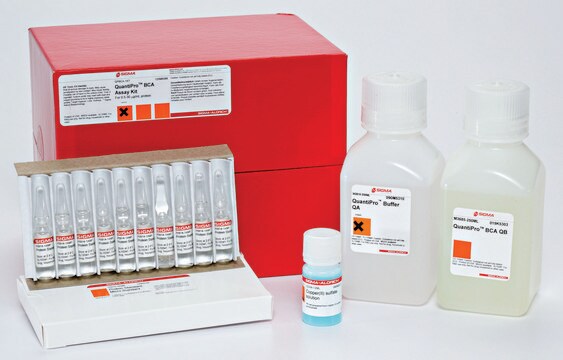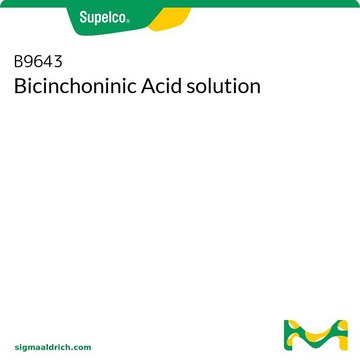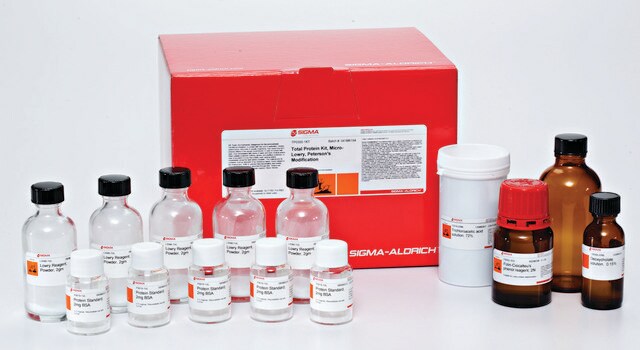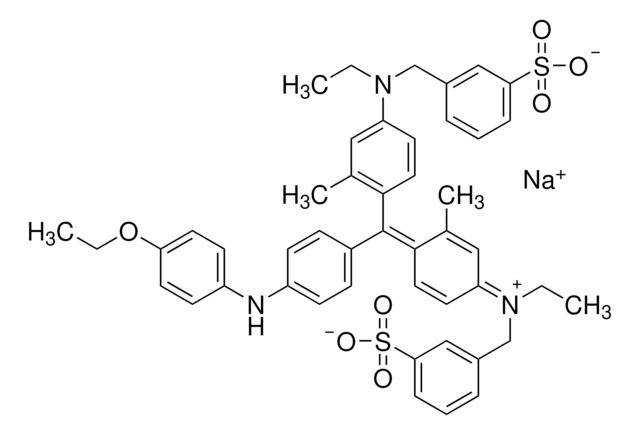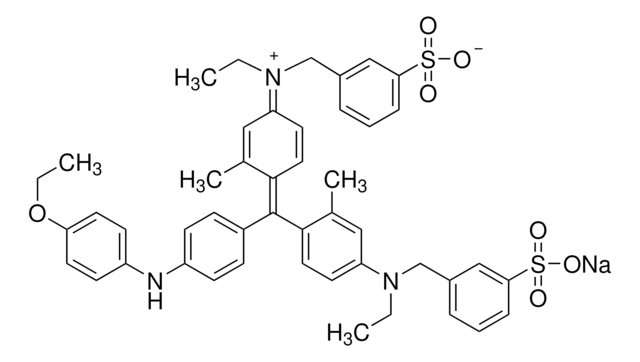FP0010
FluoroProfile™ Protein Quantification Kit
Autenticatiper visualizzare i prezzi riservati alla tua organizzazione & contrattuali
About This Item
Codice UNSPSC:
12352200
Prodotti consigliati
Condizioni di spedizione
wet ice
Temperatura di conservazione
−20°C
Applicazioni
Reversible covalent binding to proteins by the fluorophore epicocconone provides a powerful and sensitive method for protein quantification
Caratteristiche e vantaggi
- Yields an intense fluorescent red on protein binding
- Binding is completely reversible making the protein suitable for mass spectrometry and functional assays
- Water soluble proteins may be quantified without using organic solvents
- A large dynamic range, large Stokes shift and highly sensitive
- Highly tolerant of substances commonly interfering with protein quantification
- Biodegradable and environmentally friendly
Altre note
For the quantification of total protein in solution by the interaction of a unique fluorophore with the amines of polypeptides.
Note legali
FluoroProfile is a trademark of Sigma-Aldrich Co. LLC
I componenti del kit sono disponibili anche separatamente
N° Catalogo
Descrizione
SDS
- P5619Protein Standard, analytical standard, 2 mg/vial BSASDS
Avvertenze
Warning
Indicazioni di pericolo
Consigli di prudenza
Classi di pericolo
Eye Irrit. 2
Codice della classe di stoccaggio
10 - Combustible liquids
Classe di pericolosità dell'acqua (WGK)
WGK 3
Punto d’infiammabilità (°F)
Not applicable
Punto d’infiammabilità (°C)
Not applicable
Certificati d'analisi (COA)
Cerca il Certificati d'analisi (COA) digitando il numero di lotto/batch corrispondente. I numeri di lotto o di batch sono stampati sull'etichetta dei prodotti dopo la parola ‘Lotto’ o ‘Batch’.
Possiedi già questo prodotto?
I documenti relativi ai prodotti acquistati recentemente sono disponibili nell’Archivio dei documenti.
Phillip J L Bell et al.
Journal of the American Chemical Society, 125(31), 9304-9305 (2003-08-02)
Epicocconone represents a new class of natural fluorescent probes based on a polyketide skeleton isolated from the fungus Epicoccum nigrum. Epicocconone is a small, cell permeable natural product with a high molar absorbtivity and a long Stokes' shift that will
Ondřej Kaplan et al.
PloS one, 11(10), e0163697-e0163697 (2016-10-08)
We describe the production of a highly-active mutant VEGF variant, α2-PI1-8-VEGF121, which contains a substrate sequence for factor XIIIa at the aminoterminus designed for incorporation into a fibrin gel. The α2-PI1-8-VEGF121 gene was synthesized, cloned into a pET-32a(+) vector and
R P Ubrihien et al.
Archives of environmental contamination and toxicology, 82(4), 520-538 (2022-04-21)
The effects of multigenerational Cu exposure on the freshwater gastropod Isidorella newcombi were investigated. Snails were exposed to a range of treatment-specific Cu concentrations in the parental to F2 generations, and a common Cu concentration in the F3 generation. In
Helena A Schmitz et al.
Aquatic toxicology (Amsterdam, Netherlands), 160, 22-30 (2015-01-13)
Metals are accumulated by filter feeding organisms via water, ingestion of suspended sediments or food. The uptake pathway can affect metal toxicity. Saccostrea glomerata were exposed to cadmium through cadmium-spiked suspended sediments (19 and 93μg/g dry mass) and cadmium-enriched phytoplankton
Anne M Taylor et al.
Comparative biochemistry and physiology. Toxicology & pharmacology : CBP, 166, 34-43 (2014-07-11)
The metalloid selenium is an essential element which at slightly elevated concentrations is toxic and mutagenic. In Australia the burning of coal for power generation releases selenium into estuarine environments where it accumulates in sediments. The relationship between selenium exposure
Il team dei nostri ricercatori vanta grande esperienza in tutte le aree della ricerca quali Life Science, scienza dei materiali, sintesi chimica, cromatografia, discipline analitiche, ecc..
Contatta l'Assistenza Tecnica.

